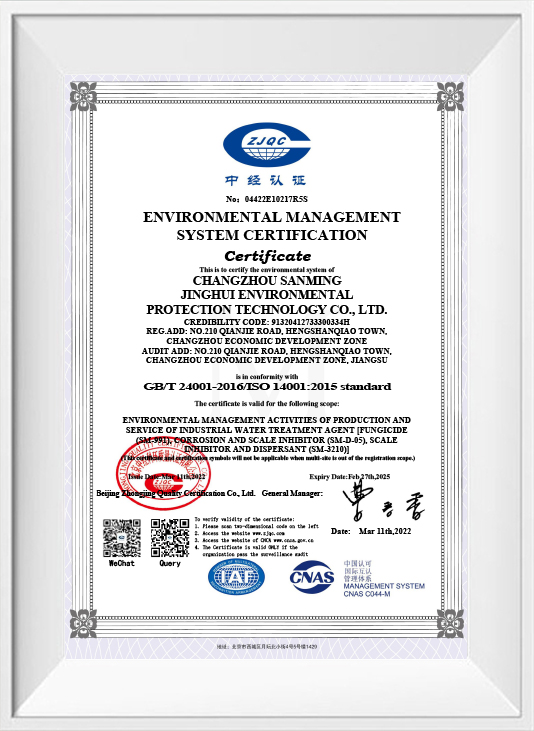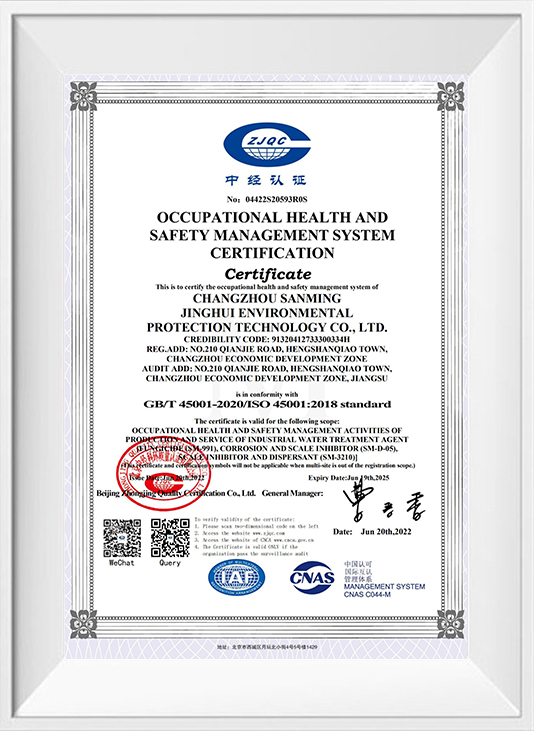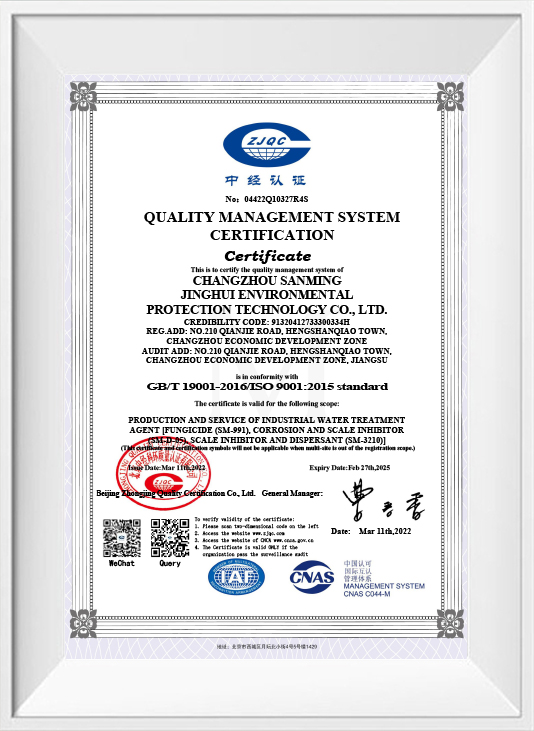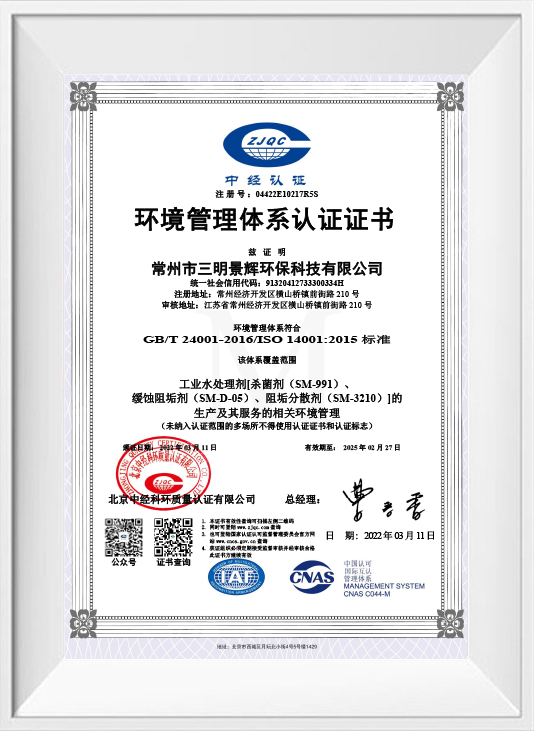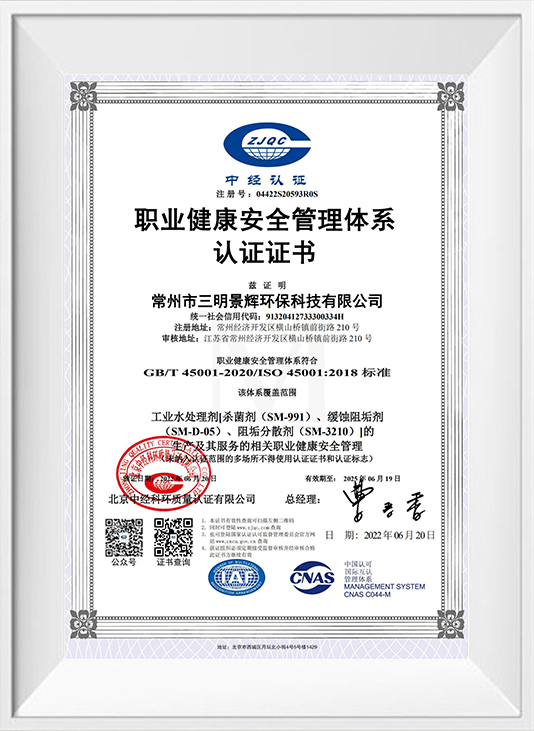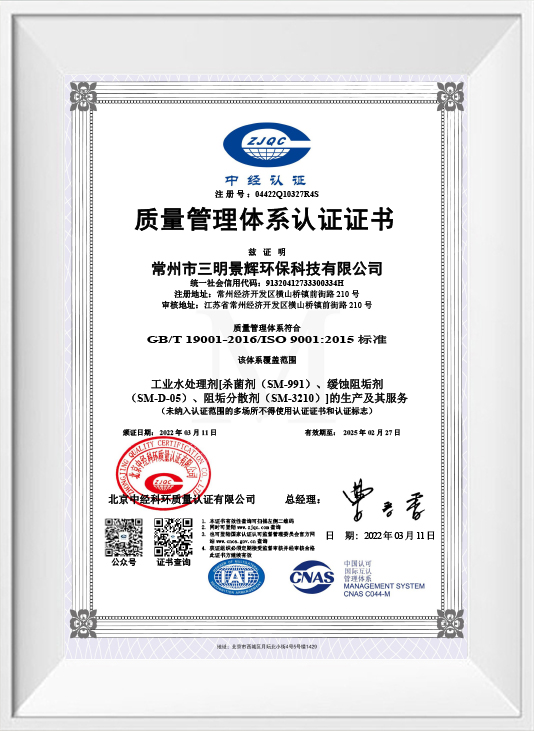1. The use of phosphorus-free corrosion and scale inhibitors in circulating water should be combined with the water quality of the circulating cooling water system to determine the dosage, typically controlled between 10 and 30 ppm.
2. The product should be added continuously.
3. The product has good compatibility and can be used with oxidizing biocides, non-oxidizing biocides, and stripping agents.
4. The phosphorus-free corrosion and scale inhibitor is widely used in power generation, petrochemicals, steel, pharmaceuticals, oil and gas fields, and other industrial sectors.
-
Circulating Water Phosphorus-Free Corrosion And Scale Inhibitor
1. The phosphorus-free corrosion and scale inhibitor is composed of multi-component phosphorus-free polymers, phosphorus-free dispersants, high-efficiency corrosion inhibitors, surfactants, etc. It features high corrosion inhibition rate, high temperature resistance, strong scale inhibition, stability, and wide applicability.
2. The phosphorus-free corrosion and scale inhibitor has good solubilization and dispersion effects on calcium carbonate and other scales in water. It effectively prevents scale precipitation on heat exchange surfaces, with scale inhibition performance in the pH range of 7.0 to 9.0.
3. Its active ingredients can quickly form a protective film on various heat exchange surfaces, continuously protecting the heat exchange interface from corrosion by dissolved oxygen.
4. The phosphorus-free corrosion and scale inhibitor for circulating water is suitable for circulating cooling water systems with medium to high hardness, medium to high alkalinity, and high pH values. It ensures the normal operation of heat exchange equipment under high concentration ratios, effectively utilizing water resources.
5. The phosphorus-free corrosion and scale inhibitor is an environmentally friendly water treatment agent that meets environmental discharge requirements in all regions.BENEFITS & FEATURES
Get a QuoteProduct Code SM-D-05BW
Appearance Light yellow to brownish yellow transparent uniform liquid
Active matter content, % ≧32.0
pH value (1% aqueous solution) 2~3
Density (20℃), g/cm3 ≧1.10
Total phosphorus content (in terms of PO43-), % ≦2.00
Since 1991
Changzhou SanmingJingHui Environmental Protection Technology Co., Ltd.
Changzhou SanmingJingHui Environmental Protection Technology Co., Ltd. (formerly Changzhou Sanming Chemical Co., Ltd.) is China Circulating Water Phosphorus-Free Corrosion And Scale Inhibitor Suppliers and OEM/ODM Circulating Water Phosphorus-Free Corrosion And Scale Inhibitor manufacturers, a high-tech, environmentally friendly and energy-saving water treatment agent professional enterprise integrating scientific research and development, production and sales, and technical services. It was founded in 1991.
The company is located in the central area of the Yangtze River Delta, close to the Shanghai-Nanjing Railway and the Beijing-Hangzhou Grand Canal, and is located in Hengshanqiao Town, the middle intersection of the Shanghai-Nanjing Expressway. It is only half an hour away from Changzhou Civil Aviation Airport and has convenient transportation. It has fixed assets of more than 18 million yuan, more than 20 scientific researchers, and 25% of employees have obtained various professional and technical titles.

-
Essential Dosing Strategies for Maximum Efficiency Proper dosing of boiler treatment chemicals is critical for protecting your system while avoiding waste. Most boiler failures result from either und...
READ MORE -
Essential Water Treatment Chemicals and Their Applications Water treatment relies on specific chemicals to remove contaminants, kill pathogens, and ensure safe consumption. The primary categories inc...
READ MORE -
Poly aluminium chloride (PAC) is a fast, robust coagulant for water treatment that typically improves turbidity and color removal with steadier pH than alum—when you set the dose by jar testing and co...
READ MORE
More product information
The Evolution of Water Treatment Technologies: From Phosphorus-Based to Phosphorus-Free Inhibitors
Phosphorus-based inhibitors were once popular due to their effectiveness in controlling corrosion and scale in industrial water systems. However, their environmental impact—particularly the contribution to phosphorus pollution and eutrophication—has driven the shift towards phosphorus-free alternatives.
Phosphorus-Based Inhibitors:Historically, phosphorus-based inhibitors were widely used because they effectively prevented scale and corrosion. Despite their efficiency, these chemicals posed serious environmental risks. Phosphorus runoff from industrial processes could lead to excessive nutrient enrichment in aquatic ecosystems, causing harmful algal blooms and degradation of water quality.
The Shift to Phosphorus-Free Technologies:In response to these environmental concerns, there has been a substantial move towards circulating water phosphorus-free corrosion and scale inhibitor. These newer formulations maintain high levels of corrosion and scale protection while eliminating the adverse environmental effects associated with phosphorus.
Benefits of Phosphorus-Free Inhibitors:
Environmental Safety: Phosphorus-free inhibitors do not contribute to eutrophication, making them more suitable for modern environmental standards and regulations.
Effective Performance: They offer robust protection against scale and corrosion without the drawbacks of phosphorus-based products.
The evolution to phosphorus-free inhibitors represents a crucial advancement in water treatment technology, aligning with environmental sustainability goals while continuing to provide effective system protection.
How Phosphorus-Free Corrosion Inhibitors Impact Household Water Systems
Environmental Benefits: Circulating water phosphorus-free corrosion and scale inhibitors eliminate the risk of phosphorus runoff, which can lead to water pollution and harm aquatic ecosystems. This makes them an environmentally friendly choice for modern water treatment needs.
Effective Protection: These inhibitors offer robust corrosion and scale control, essential for maintaining the efficiency and longevity of household water systems. They prevent scale buildup and corrosion on pipes and fixtures, ensuring reliable performance and reducing maintenance costs.
Improved Water Quality: By preventing the negative environmental impact of phosphorus-based chemicals, phosphorus-free inhibitors contribute to better overall water quality in household systems.
Our Circulating Water Phosphorus-Free Corrosion and Scale Inhibitor exemplifies the benefits of phosphorus-free technology. It effectively controls corrosion and scale, providing reliable protection while meeting environmental regulations. This ensures both the efficiency of household water systems and their alignment with sustainable practices.
 En
En
 عربى
عربى 中文简体
中文简体

